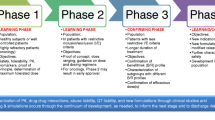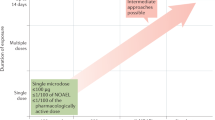Abstract
Drug development is a challenging business with high risks. Multiple factors can contribute to the failure of a programme. Lack of efficacy and unacceptable safety have been the major reasons for product failure since 2000. Even though the drug molecule and disease target are the most fundamental aspects for successful drug development, rational dose and dosing regimen selection also play an important role in the new drug development era and may determine the fate of a programme. Two case studies are discussed in detail to demonstrate the decision-making process at different stages of drug development that eventually led to the termination of the drug programmes. The two cases presented in this report both involve dose selection. The first programme may have failed as a result of too high doses, even though other factors could also contribute to the unacceptable safety profile. Early clinical studies or even late-phase clinical studies could not detect certain serious adverse events. Possible strategies to reduce this type of failure include application of quantitative structure-activity relationship (QSAR) models to select compounds with no potential serious toxicity, development of more sensitive and relevant animal models to detect drug toxicity, and targeting the minimum dose to achieve reasonable efficacy. The second programme failed during the registration stage. Lessons learned include the following: (i) modelling and simulation could have been conducted after the first pivotal trial to avoid the replication of the failed dose in subsequent trials; (ii) post-hoc subgroup analysis could be misleading, especially for innovative findings without extensive support from other sources; (iii) if the quantitative relationship between the biomarker response and the clinical endpoint is unknown, dose selection should not be guided by a statistically significant biomarker response; and (iv) a more mechanistic model could have been developed for the biomarker response based on the individual biomarker longitudinal response, which may have predicted potential tolerance for higher doses over time. Even though these programmes failed to yield safe and effective drug products, valuable knowledge should be extracted from these programmes as much as possible, in order to provide insight and guidance for all parties involved in the development of drugs, to avoid similar failures and to improve the efficiency of drug development.

Similar content being viewed by others
References
Schmid EF, Smith DA. Keynote review: is declining innovation in the pharmaceutical industry a myth? Drug Discov Today 2005 Aug 1; 10 (15): 1031–9
DiMasi JA, Feldman L, Seckler A, et al. Trends in risks associated with new drug development: success rates for investigational drugs. Clin Pharmacol Ther 2010 Mar; 87 (3): 272–7
Kola I, Landis J. Can the pharmaceutical industry reduce attrition rates? Nat Rev Drug Discov 2004 Aug; 3 (8): 711–5
Food and Drug Administration. Challenge and opportunity on the critical path to new medical products. 2004 [online]. Available from URL: http://www.fda.gov/ScienceResearch/SpecialTopics/CriticalPathInitiative/CriticalPathOpportunitiesReports/ucm077262.htm [Accessed 2011 Oct 4]
DiMasi JA, Grabowski HG. The cost of biopharmaceutical R&D: is biotech different? Manag Dec Econ 2007; 28 (4–5): 469–79
National Institutes of Health. NIH Roadmap. 2003 [online]. Available from URL: http://cit.nih.gov/NR/exeres/27AA5AD7-3644-4A12-9BD3-CAAC31F328D6,frameless.htm [Accessed 2011 Oct 4]
Rowett L. U.K. initiative to boost translational research. J Natl Cancer Inst 2002 May 15; 94 (10) 715–6
Abdel-Hamid IA, Andersson KE, Salonia A. Exploration of therapeutic targets for sexual dysfunctions: lessons learned from the failed stories. Expert Opin Ther Targets 2011 Mar; 15 (3): 325–40
Selassie CD. History of quantitative structure-activity relationships. In: Abraham DJ, editor. Burger’s medicinal chemistry and drug discovery. Pt 1, 6th ed. New York (NY): Wiley, 2003: 1–48
Paez JG, Jänne PA, Lee JC, et al. EGFR mutations in lung cancer: correlation with clinical response to gefitinib therapy. Science 2004; 30: 1497–500
Beckman RA, Clark J, Chen C. Integrating predictive biomarkers and classifiers into oncology clinical development programmes. Nat Rev Drug Discov. 2011 Sep 30; 10 (10): 735–48
FDA. FDA briefing information for the Peripheral and Central Nervous System Drugs Advisory Committee Fingolimod (NDA 22-527) Background Package. 2010 [online]. Available from URL: http://www.fda.gov/downloads/advisorycommittees/committeesmeetingmaterials/drugs/peripheralandcentralnervoussystemdrugsadvisorycommittee/ucm214670.pdf [Accessed 2011 Dec 17]
Acknowledgements
The author would like to thank the many FDA reviewers who were involved in the review of the two cases and the two sponsors that provided the data. The author would also like to thank Dr Kevin Krudys for his helpful comments. There is no conflict of interest to declare. No sources of funding were used to assist in the preparation of this review. The contents of this report represent the author’s personal opinion and do not necessarily reflect any position of the FDA.
Author information
Authors and Affiliations
Corresponding author
Rights and permissions
About this article
Cite this article
Wang, Y. Extracting Knowledge from Failed Development Programmes. Pharm Med 26, 91–96 (2012). https://doi.org/10.1007/BF03256897
Published:
Issue Date:
DOI: https://doi.org/10.1007/BF03256897




